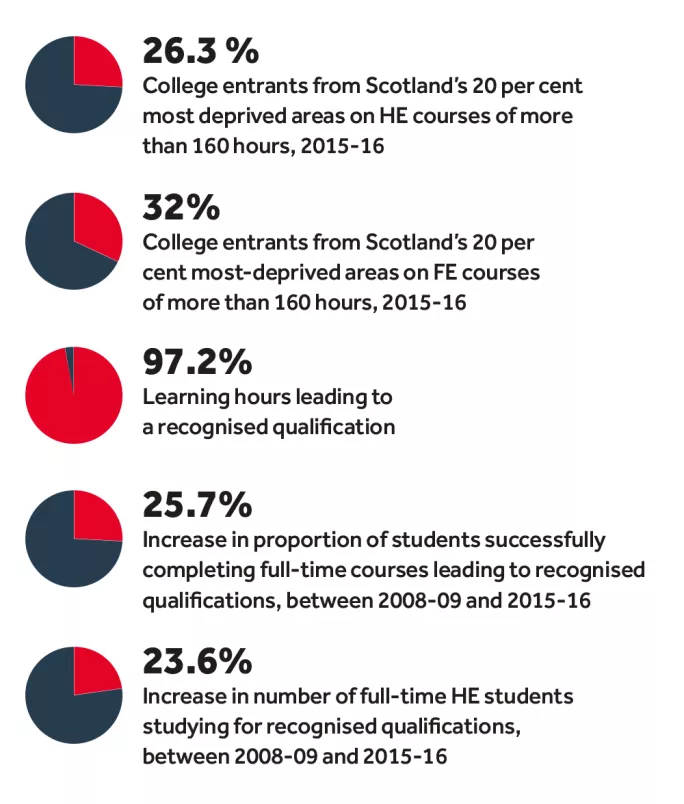
College regions pass the test

Since its inception in 2012, the government’s reform programme for the further education system has fundamentally changed the college landscape.
Regionalisation, which re-organised and merged Scotland’s colleges into 13 college regions - most with just one, large college - and the introduction of national bargaining on pay and conditions for teaching and support staff, led to uncertainty among staff and students. The fact it coincided with funding cuts for the sector meant most recorded a deficit in their most recent accounts.
But a new report published by the Scottish government today lists a series of achievements the sector has accomplished after these changes - from high satisfaction rates to more students achieving qualifications.
Scotland’s minister for further and higher education, Shirley-Anne Somerville, tells Tes Scotland in an exclusive interview that it is the government’s reform programme that has set the sector on track to that success.
“It is undoubtedly a result of the policy direction that this government has taken, in conjunction with the work that goes on within the colleges,” Somerville says. “It is the lecturing and the support staff who deliver that world-class teaching within our colleges. But I think it is the policy direction which has allowed the sector to take advantage of the good work that goes on.”
The report, Scotland’s Colleges Delivering for All, brings together the most recent data from already-published reports. It stresses that colleges have implemented “the most profound set of public sector reforms in Scottish tertiary education for more than a generation”.
However, it says “the reformed college sector is improving people’s life chances and generating the skilled workforce needed for economic growth. The college sector is one that continues to evolve and continues to deliver for the people and economy of Scotland.”
The report highlights that close to 95 per cent of college leavers progressed to “positive destinations” in 201 5-16, meaning further education, training or work. It adds that in the same year, 97.2 per cent of learning hours were delivered on courses that led to a recognised qualification - an 8.5 percentage point increase on 2006-07.
“Colleges are crucial in bridging the gap between school and industry to create a skilled future workforce that meets the needs of the regions they serve,” says the report.
It also highlights the significant contribution to HE that Scotland’s colleges make. “Entrants to college now make up 37 per cent of the total undergraduate students starting in [HE], the highest proportion in the last 10 years.
“Perhaps even more impressive is that over 41 per cent of all full-time college activity was in HE-level courses in 2015-16, also the highest proportion ever.”
The number of full-time HE students studying for recognised qualifications at colleges has grown by 23.6 per cent since 2008-09.
‘Fantastic work’
“Bringing all these statistics together demonstrates the fantastic work that goes on day in and day out in our college sector,” Somerville says. “The important thing for me as minister was to bring all that together, to recognise the success and the fantastic work that goes in throughout the college system.”
The report, she says, is the government’s message to the sector that “we recognise your value and the integral role they have within our wider education system”.
“We know the FE sector has been through a tremendous amount of change - and that is always difficult,” she acknowledges, adding: “The work we have done and the policies the government has undertaken…have allowed us to get to a point where we have a sector in which our institutions are large enough to be able to play a fantastic role in delivering for the regional economy as well as for their local populations. That has allowed the staff within the colleges to deliver this success.”
“The policy framework presented challenges to the sector when we were implementing it, but the testimony we have now within this report demonstrates why we did that and has allowed the lecturing and support staff to provide the world class education that we have within our colleges,” says the minister.

A mixed picture emerged from Audit Scotland’s 2017 report on the Scottish colleges sector, which concluded that it had “continued to exceed the national target for learning but delivered slightly less activity than in 2014-15”, with two regions failing to meet their target. Both full-time and part-time student numbers fell slightly in 2015-16, with the number of full-time equivalent students at its lowest level since 2006-07. The report added: “The financial health of the college sector remains relatively stable but has deteriorated since 2014-15.”
Colleges Scotland chief executive Shona Struthers says that, while colleges have continued to deliver high-quality learning and teaching and provide opportunities for people to learn new skills, gain qualifications and progress towards their chosen career, the reforms have had positive benefits.
“For example, colleges are now working more closely with each other and employers to map out the curriculum and are building more cohesive relationships with schools, universities, employers and stakeholders to ensure that they are meeting the needs of the regions they serve,” says Struthers.
“Colleges are performing well and exceeding their activity targets, as well as helping to realise Scotland’s wider ambitions such as reducing inequalities, raising attainment and economic growth.”
However, she adds that while the extra funds announced in the draft budget to cover the additional costs of the recent deal for staff pay and conditions, “it does mean that finances will continue to be tight.”
You need a Tes subscription to read this article
Subscribe now to read this article and get other subscriber-only content:
- Unlimited access to all Tes magazine content
- Exclusive subscriber-only stories
- Award-winning email newsletters
- Unlimited access to all Tes magazine content
- Exclusive subscriber-only stories
- Award-winning email newsletters
You need a subscription to read this article
Subscribe now to read this article and get other subscriber-only content, including:
- Unlimited access to all Tes magazine content
- Exclusive subscriber-only stories
- Award-winning email newsletters
- Unlimited access to all Tes magazine content
- Exclusive subscriber-only stories
- Award-winning email newsletters